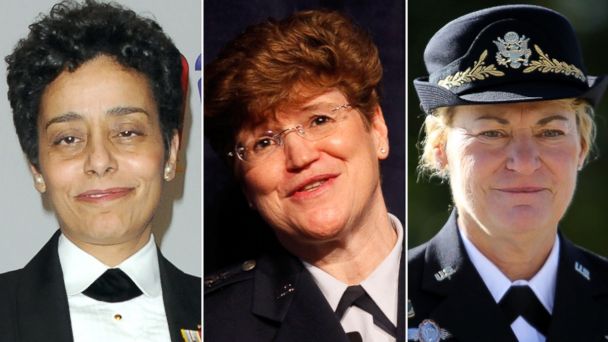Meet the US Military's Three Four-Star Women
When Navy Secretary Ray Mabus pinned a fourth star on Adm. Michelle Howard's uniform this week, he was not only making her the branch's second-highest-ranking officer, he was also inducting her into a tiny and elite group of the military's highest ranking women.
So tiny and so elite that Howard joins just two other women currently serving in the U.S. armed forced who hold the four-star rank. Howard also become the highest-ranking African-American woman ever in any branch of the military.
"If you don't believe today was a first, when I called to order four-star shoulder boards for women, they didn't exist," Howard said at her promotion ceremony on Tuesday. "[A] special contract was let, and you folks are seeing the first set in the history of the United States Navy."
Navy Secretary Ray Mabus acknowledged the significance of Howard's promotion and added the Navy simply picked the best officer for the job.
"She is a representation of how far we have come and how far she has helped bring us, she and so many, so many others have helped us to this day," Mabus said. "I believe that today is an example of a Navy that now reflects the highest ideals of the nation that we serve - a nation where success is not born by ethnicity or gender, but by skill and ability."

Adm. Michelle Howard (Navy), Gen. Janet Wolfenbarger (Air Force) and Gen. Ann Dunwoody (Army). (Getty Images)
Howard commanded the Navy task force involved in the Maersk Alabama rescue, which became the plot of the film "Captain Phillips."
Like her four-star predecessors, the unassuming admiral seems eager to focus more on the accomplishments of her Navy colleagues than on her promotion's historical significance.
Ann Dunwoody: Cracking the 'Brass Ceiling'
The military's first female four-star general, Army Gen. Ann E. Dunwoody, cracked the military's "brass ceiling" in 2008, when she was awarded her fourth star and named commander of the Army Materiel Command, the unit that equips, outfits, and arms U.S. soldiers.
Not one to fancy herself a trailblazer, Dunwoody was reportedly uncomfortable with the label.
"History will, no doubt, take note of her achievement in breaking through this final brass ceiling to pin on a fourth star. But she would rather be known and remembered, first and foremost, as a U.S. Army soldier," then-Defense Secretary Robert Gates said at Dunwoody's promotion ceremony.
"I grew up in a family that didn't know what glass ceilings were," Dunwoody said, adding she "just wasn't prepared for the enormity" of the milestone.
"There is no one more surprised than I - except, of course, my husband," she joked. "You know what they say, 'Behind every successful woman there is an astonished man.'"
Dunwoody - who says she herself "never worked for a female" - joined the army in 1975 as part of the Women's Army Corps, which was disbanded just three years later to allow integration of male and female troops.
She went on to become the first woman to be a battalion commander for the 82nd Airborne Division and later, the first woman to serve as a general at Fort Bragg.
Before her retirement in 2012, Dunwoody worked to curb sexual assault in the military, but has argued against there being a chauvinist mentality in the Army.
"There's this notion that there is a 'good old boy network' that would allow people to sweep this under the rug," Dunwoody said. "My experience is that's not the case."
Janet Wolfenbarger: Co-Ed Class
Less than four years later after Dunwoody's promotion, Air Force Gen. Janet Wolfenbarger was also elevated to four-star rank and made commander of Air Force Materiel Command.
Wolfenbarger was a member of the Air Force Academy's first co-ed class, and went on to earn multiple degrees in engineering and aeronautics and serve as an intelligence analyst at Eglin Air Force Base.
"I have spent my career working hard and doing the very best I could at every job that was given to me with the belief that I could be treated equally, that there was no discrimination, no differentiation because of my gender," she said. "So it was important to me to be recognized for what I did, not what my gender was."
"I avoided, early in my career, any opportunity to go to, for instance, a woman's leadership symposium," she told TIME in 2012. "I have now since had the opportunity to attend some women's leadership symposiums as the senior ranking woman in the air force. … I've come to appreciate that I do have a responsibility to give back, to represent my service so that we can showcase that the Air Force in fact has embraced diversity."
ABC News' Louis Martinez contributed to this report.